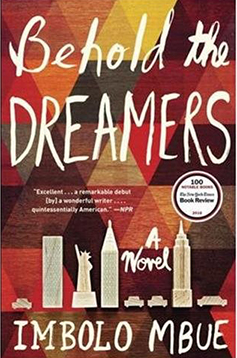When Imbolo Mbue attended the ceremony in Washington, D.C., this month to receive the 2017 PEN/Faulkner Award – America’s largest peer-juried fiction prize – for her debut novel, Behold the Dreamers, some her closest friends from Rutgers were by her side.
The novel, about a couple from Mbue’s hometown in Cameroon making a new life in New York City in 2008 just as the recession upends the economy, has earned critical acclaim for its exploration of immigration, class, race, marriage and the trappings of the American Dream.
“I’ve spent most of my life as an immigrant in the United States, and it is at Rutgers where my journey essentially began,” says Mbue, 36, who graduated from Rutgers University-New Brunswick with a bachelor’s degree in business management in 2002.
Behold the Dreamers (Random House 2016), in many ways, is informed by Mbue’s life. She grew up in Limbe, a seaside city in the southwest region of Cameroon, frequently going without running water. Though there were no public libraries where she lived, rarely was she without a book. “From the time I was 8 or 9, I would pick up books off the shelves at my aunt’s house,” she said. “I read anything I could find – Robinson Crusoe, Gulliver Travels, Shakespeare’s comedies and tragedies.”
When Mbue was 17, an aunt and uncle sponsored her to come to America for an education, and based on its solid reputation, she chose Rutgers’ Douglass College. She made friends easily. “I was very comfortable at a school where there was so much diversity. I met other Africans who shared my points of view and I also realized early on that I enjoyed spending time with people who were different from me,” she said.
Following graduation, life got more challenging. She circulated through various jobs, from preschool secretary to dental office receptionist, even selling lingerie at Nordstrom for a time. During this period she borrowed a library copy of Song of Solomon by Toni Morrison, which exposed her to the African-American experience in a way she hadn’t fully understood. “I was blown away by how powerful it was,” said Mbue. Inspired, she decided to teach herself to write fiction.
In the mid-2000s, Mbue moved to New York and worked her way through a master’s program in education and psychology at Columbia University’s Teachers College, writing fiction whenever she had a chance. She was working in marketing for a media company and thinking about pursuing a Ph.D. in education, when the financial crisis hit in 2008 and, ultimately, she lost her job.
“I was disillusioned about America, and frequently questioning the idea of the American dream. Was it really worth leaving home for?” she said. In 2011, walking past Manhattan’s Time Warner building, she noticed a line of chauffeurs standing and waiting for executives. “I wondered what the relationship between a white executive and his African immigrant chauffeur might be like, and the different way in which the recession might have affected their lives,” she said. “I wanted to tell a story from both perspectives, about how the crisis affected New Yorkers in different socio-economic groups.”
Mbue put aside what she’d been working on and started a manuscript about a fictional Lehman Brothers executive and his Cameroonian chauffeur, which ultimately became Behold the Dreamers. The book took her five years to write. Mbue, who is married with children and became a U.S. citizen in 2014, found an agent after countless rejections and sold the novel to Random House. Sony’s TriStar Pictures has purchased the film rights, with George Clooney and Grant Heslov of Smokehouse Pictures producing.Despite her success, Mbue rejects the notion of an American Dream which, she believes, needs to be redefined.
“This idea that hard work will always be materially rewarded, I don’t believe it’s true in America or in life in general. This is a country of unbelievable inequality – millions of people work hard and the American Dream continues to be far out of their reach, so why should I support the existence of such a concept?” she said.
“That’s why I’m thankful to Rutgers, because it gave me a great foundation in questioning the world and seeing America’s complexities.”
For media inquiries, contact Carla Cantor at 848-932-0555 or ccantor@ucm.rutgers.edu.




